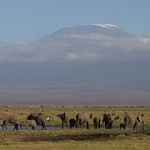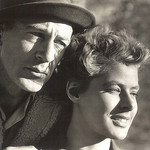Sometimes it feels like you can’t move an inch without hitting something very Hemingway related. From the recent book about Hadley (The Parisian Wife) to Zelda Sayre Fitzgerald’s life story (Z) to a show in the Berkshire’s about Hemingway and Fitzgerald and their last encounter, and Woody Allen’s delightful Midnight in Paris, it seems that Hemingway remains relevant and his ripples are felt regularly, especially in the arts.

The latest entry to this group is the new Robert Redford film, All is Lost. Called by several critics “Robert Redford’s greatest performance,” he has two words of dialogue in the whole film. While stranded on his boat, which has been disabled in the middle of the Indian Ocean, he has a struggle with a huge marlin, not unlike Hemingway’s Santiago, and ultimately is hoping just to survive. While the modern character moans “God,” it’s followed by the universally understaood, albeit uncouth, word of despair, “f***!”

Instead, Hemingway’s dialogue from Santiago is: “I am not religious” he says aloud, alone in his skiff holding the line, hands bleeding, muscles aching, as he battles the great fish. “But I will say ten Our Fathers and Ten Hail Marys that I should catch this fish. And I promise to make a pilgrimage to the Virgin of Cobre if I catch him.”
As I wrote somewhere earlier in this blog, many Hemingway readers are not fans of fishing, bull fighting, war, or hunting. In fact, many of us don’t like those topics at all. However, we are fans of man’s humanity, of man’s and women’s will to live, of surviving despite defeat with head jerked high, and of love that is worth all sacrifice. Those were Hemingway’s themes and topics. It’s what keeps many of us coming back to him.

In a three-page short story, he can move a reader to tears. In The Snows of Kilimanjaro, a long short story, we all understood Harry’s life and what had happened and how he had lost himself. Harry, built loosely on Hemingway himself, had always feared death and now that’s he ‘s faced with it, he steps back and almost analyzes it from the outside. He’s frankly too exhausted and weak with fever to fight it and he accepts it as it’s due, as it lurks outside of his tent, a hideous hyena with bad breath, waiting. What he regrets is that he won’t have time to write the other stories that are in his head and the loss of so many of the things that he loved doing, the loss of love, the hurt to those that were loyal to him. Who can’t relate to that on each of our own personal levels?

That’s why Hemingway never gets old and we overlook some of the things that don’t resonate with us because most of it does. A bullfight is a life struggle; hunting can be a battle to survive; and love can be the greatest loss and triumph of your life.



